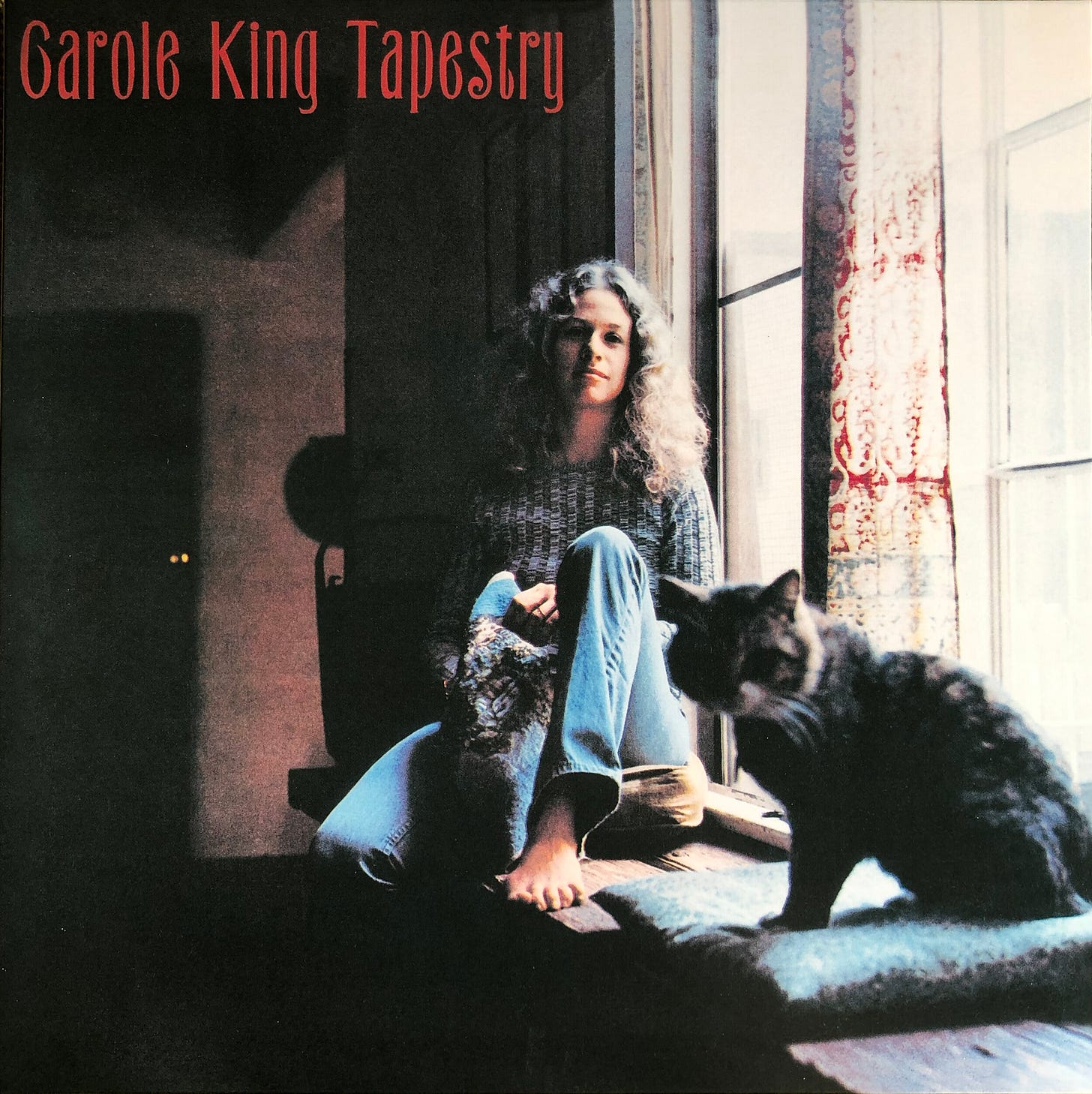You never forget your first favourite record. For me, that record was Tapestry (1971). Cultivated in some 50 years ago in California, this record has always spoken to me. Why?
Tapestry is what happens when an artist decides to tell a story for themselves. Through the 1960s, King had written for the biggest names in popular music, but in 1970, her friend and fellow collaborator, James Taylor, persuaded her to begin writing music for herself, to perform and release under her own name. In the same way that great scientists discover new elements, great musicians discover - or create - new genres. The ‘singer/songwriter’ genre was such an outcome, borne out of King’s efforts, among others.
There’s an independence to this record. The music is inviting, and allows you to come in from the cold, pull up a seat, and instantly access the emotions King is calling upon in you. I’ve occasionally heard Tapestry described as a ‘feminist’ album - which is massively limiting to the story this record aims to tell. Yes - in some ways it’s a woman finding her voice and telling her story on her own terms, but the message isn’t designed to glorify this experience of solitude. In fact, it’s actually a very realistic portrayal of the tumult of leaving a relationship, and rediscovering yourself, for better and worse. There’s a sense of freedom to much of it - the “I can do whatever I want now” attitude that comes with a separation from a romantic counterpart - but also a deep sadness, a palpable sense that when the horn section fades away, and the party winds down, and it’s just you, perched on a window seat with your cat, and things can get lonely. This contrast allows the listener to experience the reality of independence - it’s not freedom, exactly, but maybe some caveated version of it that reminds us that the bad always comes with the good.
Tapestry takes on themes of distance, time, and space, and their effect on us. Even a glance at the track titles reveals some of this - songs like ‘So Far Away’, ‘Home Again’, and ‘Will You Still Love Me Tomorrow?’ use literal portrayals of these themes in a lyrical fashion that evoke a sense of longing. Just try listening to one of those songs when you’re feeling homesick and you’ll see what I mean. However, as with the contrast of together / alone, the contrast between home / away pushes the listener to admit that while familiarity is warm and welcoming, it can be a sickly comfort food that stifles a further pursuit of possibilities: lives not yet lived, romances yet to blossom, and far-off lands that remain unexplored, as you ponder questions of meaning from inside your safehouse.
The album is galvanized by incredible piano and guitar riffs all the way through, but the real hero is the lyricism. Carole has a remarkable way of describing complex emotions and delivering deep ballads through the most simple and elegant turns of phrase. A perfect example of this is in ‘Will You Still Love Me Tomorrow?’ , where Carole describes an evening with a lover. It’s a theme explored in so much music - the 1971 version of “What are we? Is this just a hookup? Do you care about me, or is this just a physical thing?” While in 2022, the above utterance might masquerade as artistic contemplation and romantic ponderance, King here uses the following turn of phrase to convey her concerns:
Tonight with words unspoken,
You say that I’m the only one.
But will my heart be broken,
When the night meets the morning sun?
You don’t hear lyrics like that on the radio all that often anymore.
Finally, I should add that this record was particularly influential on me at a young age in discovering my own singing voice. I sung "Where You Lead" for my primary school choir audition at 8 years old. It’s interesting to realise that, listening to this record as a kid, I could understand what romance and the experiences of life with others - or yourself - was about, despite having never experienced it. It takes a special talent to interpret such adult, moving experiences, and distil them in a way that opens the door to a wide audience. Doubtless, it’s this factor of ultimate accessibility that helped contribute to its massive commercial success at the time of its release, while remaining absolutely timeless. Tapestry will remain perpetually current, in my opinion, for as long as humans have a means to listen to it.
Tapestry is the kind of record that proves why the idea of an album is special: it's a full-on emotional experience from start to finish. Wherever I go in the world, this one will always be with me. If you haven’t heard it yet, sit down with Carole and Telemachus on your window seat, and give it a spin today.
###
Boring factoids from Wikipedia: To date, Tapestry still holds the record for most consecutive weeks at number one by a female solo artist. The album also spent nearly 6 years charting US Billboard 200 (318 weeks), in which she also spent 302 consecutive weeks. For more than 40 years, Tapestry held the record for the longest charting album by a female solo artist in the US until Adele's 21 broke the record in 2017.



